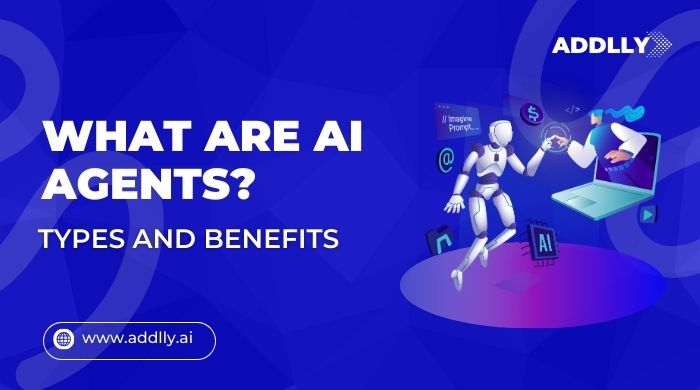AI agents are software programs that use artificial intelligence to perform specific tasks with little to no human intervention. These intelligent agents process collected data from their surroundings and take action to achieve a desired outcome. Businesses use AI agents to improve customer interactions, automate complex tasks, and provide up-to-date information for better decision-making.
AI agents rely on machine learning models and natural language processing (NLP) to understand and respond to customer inquiries. They can be autonomous agents that operate independently or functional agents that require human oversight. Some well-known AI agent examples include content creation, social media post creation, customer support agents, and virtual assistants.
In this guide, we will explore the types of AI agents, their benefits for businesses, how they can transform various industries in 2025 and beyond, and how businesses can use Addlly AI to create AI Agents for Marketing like SEO AI Agent, AI GEO Agent, Social Media AI Agent, and more for their marketing needs.

Quick Summary
- AI agents are intelligent software programs that use machine learning and NLP to perform tasks with little or no human intervention.
- Types of AI agents include simple reflex agents, model-based reflex agents, goal-based agents, utility-based agents, hierarchical agents, multi-agent systems (MAS), and learning agents.
- Businesses use AI agents for efficiency in customer support, marketing automation, data analysis, and operations management.
- Key benefits: higher productivity, smarter decision-making, personalized customer experiences, and reduced operational costs.
- Challenges to consider: data security, AI bias, reliability, and the need for some human oversight.
- Future outlook: AI agents will keep evolving, becoming more autonomous, industry-specific, and central to business growth strategies.
What are AI Agents?
An AI agent is a software program that performs specific tasks using artificial intelligence. These intelligent agents analyze sensor data, process relevant information, and take action to achieve a desired outcome. AI agents work in partially observable environments, making decisions based on the collected data and their internal model.
AI agents rely on machine learning, natural language processing (NLP), and data analysis to interact with human users. They can function as customer support agents, writing agents, or even advanced AI agents that handle complex tasks in industries like healthcare, finance, and marketing.
Unlike traditional software, AI agents continuously learn from training data to improve their ability to provide the most appropriate response. These autonomous agents reduce human intervention and improve efficiency in handling customer queries, operational costs, and decision-making processes.
Evolution of AI Agents in Business
AI agents have evolved significantly over the years, transforming from basic software programs to advanced AI agents capable of handling complex tasks. Early AI agents were simple rule-based systems that followed predefined instructions. These agents had limited capabilities and required constant human oversight to function properly.
With advancements in machine learning and natural language processing (NLP), AI agents work more efficiently by analyzing collected data and generating the most appropriate response based on real-time inputs. Model-based agents now use an internal model to predict outcomes and improve decision-making.
Today, businesses use custom AI agents for customer support, marketing, and data analysis. AI-powered customer support can handle customer inquiries, provide up-to-date information, and enhance customer satisfaction.
As technology advances, AI agents depends more on sophisticated learning elements to adapt to changing business needs and deliver better results.
Read this article on: Best No Code AI Tools For Your Business
Types of AI Agents
1. Simple Reflex Agents
Simple reflex agents follow predefined rules to respond to inputs from their environment. These AI agents work on the assigned tasks by analyzing sensor data and taking immediate action without considering past experiences.
Since simple reflex agents do not store past data, they perform well in predictable settings but struggle in partially observable environments. They rely on condition-action rules to determine the most appropriate response.
Common AI agent examples include automatic temperature control systems and traffic light controls. Unlike model-based agents, they lack on predicting the future conditions, limiting their adaptability.
2. Model-Based Reflex Agents
Model-based reflex agents use a custom model to understand how their environment works. Unlike simple reflex agents, they store past collected data to make better decisions in partially observable environments.
These advanced agents uses previous inputs to predict future conditions and select the most appropriate response. This makes them more adaptable than lower-level agents that follow fixed rules.
Unlike other agents, these intelligent agents improve automation by reducing human intervention in decision-making.
3. Multi-Agent System (MAS)
A multi-agent system (MAS) consists of multiple AI agents that work together to complete complex tasks. These intelligent agents communicate and collaborate, making them more efficient than a single AI agent working alone.
MAS is widely used in robotics, simulations, and business automation. These systems rely on learning agents that adapt to changing environments by analyzing collected data. Each agent has a specific agent function, allowing them to specialize in different specific objectives while improving overall system performance.
Examples of MAS include swarm robotics, traffic management systems, and automated stock trading platforms.
4. Hierarchical Agents
Hierarchical agents operate at different levels, where higher-level agents oversee lower-level agents to complete specific tasks efficiently. This structured approach helps in managing complex tasks within an AI system, improving decision-making and automation.
These agents follow a layered structure, where decisions made at the top level guide actions at the lower levels. They often use a utility function to determine the best course of action, optimizing performance based on predefined objectives.
5. Goal-Based Agents
Goal-based agents make decisions by evaluating different actions to achieve a desired outcome. Unlike simple reflex agents, they do not just react to inputs; instead, they analyze collected data and plan the best path toward their goal.
These AI agents work by considering future consequences before taking action. They often rely on machine learning models and data analysis to improve decision-making.
6. Utility-Based Agents
Utility-based agents make decisions by selecting the best possible action based on a utility function. Unlike goal-based agents, which focus only on achieving a desired outcome, these agents evaluate different options and choose the one that provides the highest benefit.
These AI agents work by assigning numerical values to different choices and selecting the most effective one. This makes them useful for complex tasks that require optimization, such as self-driving cars determining the safest and fastest route.
Businesses use utility-based agents in AI systems to improve customer satisfaction, reduce operational costs, and enhance automation.
7. Learning Agents
Learning agents improve their performance over time by analyzing collected data and adjusting their behavior. Unlike reflex agents, which follow fixed rules, these AI agents work by continuously refining their decision-making process using machine learning models.
A learning agent has a learning element that helps it adapt to new situations. This allows it to handle complex tasks with minimal human intervention. These agents are widely used in customer interactions, self-driving cars, and automated AI systems.
By processing training data, learning agents enhance customer satisfaction, provide up-to-date information, and improve business automation.
Read our guide on: Best Generative Engine Optimization (GEO) Agencies
Benefits of AI Agents for Businesses
1. Enhanced Efficiency and Productivity
AI agents help businesses complete specific tasks faster and more accurately than human workers. By automating complex tasks, companies can streamline operations and improve overall productivity.
Customer support agents, for example, handle customer inquiries instantly, reducing wait times and improving customer satisfaction. In industries like manufacturing, autonomous agents optimize production processes, ensuring smooth operations with minimal human intervention.
Using machine learning models, AI-powered systems process collected data in real-time, identify patterns, and provide relevant information to improve workflow efficiency. This allows businesses to focus on strategic growth while AI agents manage repetitive tasks.
2. Improved Decision-Making
AI agents enhance decision-making by analyzing vast amounts of collected data and identifying trends that humans might overlook. These intelligent agents use machine learning models and data analysis to provide businesses with up-to-date information for better strategic planning.
For example, autonomous agents in finance assess market trends and predict investment risks, while customer support agents analyze customer inquiries to offer personalized solutions. AI-powered decision-making minimizes errors and ensures businesses make data-driven choices.
By relying on AI for complex tasks, companies reduce human intervention, improve accuracy, and achieve better outcomes in critical business operations.
3. Personalized Customer Experiences
AI agents enhance customer interactions by providing tailored recommendations and responses based on collected data. These intelligent agents analyze customer queries, purchase history, and behavior to deliver personalized solutions that improve customer satisfaction.
For example, customer support agents powered by natural language processing (NLP) understand and respond to customer inquiries more effectively. AI-powered chatbots provide up-to-date information, helping businesses engage with human users in a more meaningful way.
By reducing response times and offering relevant information, AI agents work to build stronger relationships with customers, leading to higher customer engagement and brand loyalty.
4. Cost Reduction
AI agents help businesses lower operational costs by automating specific tasks that would otherwise require human labor. By handling customer queries, managing data analysis, and optimizing production processes, AI reduces the need for large customer service teams and manual workflows.
For example, customer support agents powered by natural language processing (NLP) handle multiple customer inquiries at once, reducing labor costs. In manufacturing, autonomous agents streamline operations, minimizing waste and improving efficiency.
By improving decision-making and automating complex tasks, businesses save money while increasing productivity and ensuring higher customer satisfaction.
Read our blog post on: What Is Answer Engine Optimization? Guide for AEO
Real-World Applications of AI Agents in 2025
1. AI Agents in Marketing
AI agents are revolutionizing marketing by analyzing collected data, predicting consumer behavior, and automating customer interactions. These intelligent agents help businesses create targeted campaigns, optimize ad placements, and improve customer engagement.
For example, AI-powered tools generate personalized recommendations based on customer queries and browsing history. Machine learning models identify patterns in consumer behavior, allowing brands to deliver relevant information to the right audience at the right time.
By automating specific tasks like content creation and ad optimization, AI agents work to enhance marketing efficiency while reducing operational costs.
2. AI Agents in Customer Service
AI agents are transforming customer service by handling customer inquiries, resolving issues faster, and providing up-to-date information without requiring constant human intervention. Businesses use customer support agents to improve customer satisfaction by delivering quick and accurate responses.
These intelligent agents powered by natural language processing (NLP) understand and respond to human users in real time. They analyze collected data to offer personalized support, reducing wait times and increasing efficiency.
By automating customer interactions, AI helps businesses manage large volumes of requests, ensuring a seamless support experience while reducing operational costs.
3. AI Agents in Operations Management
AI agents play a key role in operations management by automating complex tasks, optimizing workflows, and improving decision-making. These intelligent agents analyze collected data to enhance efficiency in logistics, supply chain management, and production.
For example, autonomous agents track inventory levels, predict demand, and ensure timely restocking, reducing waste and improving productivity. Machine learning models help businesses identify patterns, streamline production processes, and minimize operational costs.
By reducing human intervention and providing up-to-date information, AI agents work to improve efficiency, accuracy, and overall business performance.
Read our blog on: GEO Audit vs SEO Audit
Challenges and Considerations of AI Agents
While AI agents offer many benefits, businesses must address certain challenges to ensure their effectiveness. Implementing AI requires careful planning, continuous monitoring, and ethical considerations.
1. Data Security & Privacy
AI systems handle sensitive data, making them vulnerable to cyber threats. Businesses must ensure strict security measures to protect customer interactions and collected data.
2. Accuracy & Reliability
Machine learning models depend on high-quality data. Poor input can lead to incorrect responses, affecting customer satisfaction and business decisions.
3. Human Oversight
Despite automation, AI agents work best with human intervention to prevent errors and biases, ensuring ethical decision-making.
4. AI Bias & Fairness
AI may develop biases from training data. Regular audits help ensure fairness in customer support agents and autonomous agents.
Addressing these challenges helps businesses maximize AI’s potential while maintaining trust and efficiency.
Please go through our guide on: Best AI Visibility Optimization Tools
How Custom AI Agents from Addlly AI Can Help Your Business
At Addlly AI, we specialize in creating custom AI agents tailored to your unique marketing needs. Our platform offers advanced tools like the AI SEO Writer, which generates SEO-friendly content in seconds, and the Social Media Post Generator, to craft engaging posts that resonate with your audience.
Whether you require content that reflects your brand’s voice or need to produce newsletters for your customers, Addlly AI provides solutions designed to enhance your marketing efforts. By using our AI-powered tools, businesses can streamline content creation, maintain consistency across platforms, and effectively engage their target audience.
Explore our offerings at Addlly AI to discover how our custom AI agents can elevate your marketing strategy.
Predictions for AI Agents Beyond 2025
The future of AI agents will focus on more freedom, improved decision-making, and deeper integration into business operations. Learning agents will become more advanced, requiring less human intervention while improving adaptability through high-quality data and real-time data analysis.
In customer service, AI-powered customer support agents will provide even more personalized responses using natural language processing (NLP) and predictive analytics. In industries like healthcare and finance, AI systems will assist in critical decision-making with increased accuracy.
As technology progresses, autonomous agents will reshape industries by automating complex tasks, reducing operational costs, and enhancing overall efficiency.
Final Words
AI agents are transforming the way businesses operate, offering automation, efficiency, and improved customer interactions. From handling customer inquiries to optimizing production processes, these intelligent agents play a crucial role in modern industries.
By integrating custom AI agents from Addlly AI, businesses can enhance their marketing efforts, generate high-quality content, and automate specific tasks with ease. Whether you need AI-driven blog writing, personalized newsletters, or customer support agents, Addlly AI provides the right solutions.
As AI technology advances, businesses that adopt AI agents will stay ahead of the competition, reduce operational costs, and improve overall customer satisfaction. Now is the time to explore the potential of AI and integrate it into your business strategy.
FAQs – What are AI Agents?
What Does an AI Agent Do?
An AI agent is a software program that performs specific tasks using artificial intelligence. These intelligent agents analyze collected data, process sensor data, and make decisions with minimal human intervention. AI agents work in various industries, automating customer interactions, enhancing data analysis, and improving efficiency in partially observable environments like finance, healthcare, and marketing.
How Can AI Agents Benefit Businesses?
Businesses use AI agents to automate complex tasks, improve customer satisfaction, and reduce operational costs. Customer support agents handle customer inquiries, while autonomous agents assist in production processes and logistics. By leveraging machine learning models, companies can optimize workflows, analyze high-quality data, and make better decisions with up-to-date information, boosting overall efficiency.
Is ChatGPT an AI Agent?
Yes, ChatGPT in a way is an AI agent powered by natural language processing (NLP) and machine learning models. It assists with customer queries, generates content, and automates customer interactions. Like other intelligent agents, ChatGPT processes collected data, learns from inputs, and provides the most appropriate response based on context, making it valuable for businesses and individuals.
What are the 5 Types of AI Agents?
The five types of AI agents include simple reflex agents, model-based reflex agents, goal-based agents, utility-based agents, and learning agents. Simple reflex agents follow rules, while model-based agents use an internal model to make decisions. Goal-based agents aim for a desired outcome, utility-based agents optimize choices with a utility function, and learning agents improve over time using training data.


